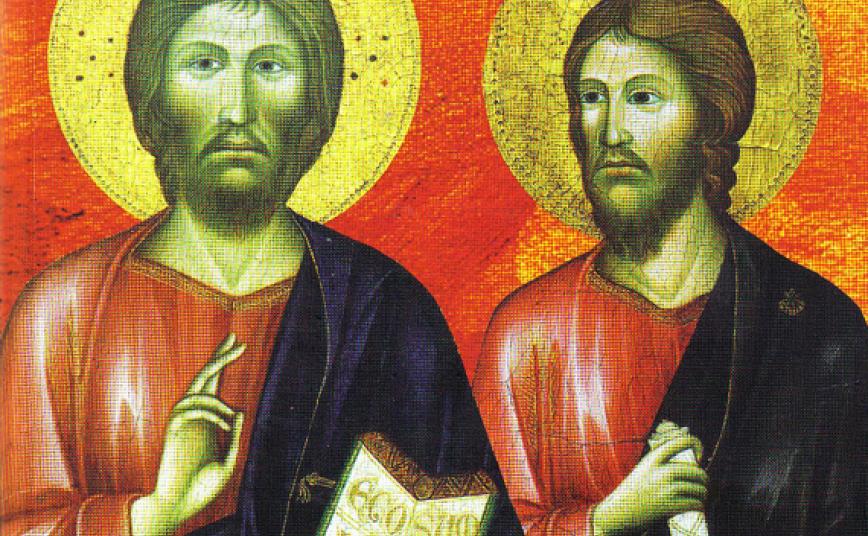
“…whoever wishes to become great among you must be a
slave of all.” (Mark 10:43)
Oh, those whacky Zebedee boys! They’re at
it again. In the Gospel appointed for Pentecost 22, Year B (Mark 10:35-45),
James and John get a little giddy at the prospect of approaching Jerusalem.
They just can’t wait to enter the city and see Jesus hailed as the Messiah.
But, boy..! Do they have a surprise coming!
If you’ve been reading along in Mark’s
Gospel, you might’ve noticed that Jesus has told the disciples no less than three times[i]
that he’s going to be rejected and crucified. Nevertheless, it seems to have
gone in one ear and out the other for these two lads. They can’t wait to see
the crowds mobilize, hail Jesus as king, and take important seats in his new
government. They want to sit at the right and left hand—Vice President and
Secretary of State. Yup! They’re going to throw out that slimy bunch of pagan
Romans and their Sadducee myrmidons and take over the whole operation
themselves. They’ll show those foreign scumbags that they’ve messed with the
wrong bunch of Chosen People.
So Jesus has to bring them up short and
ask them if they’re willing to suffer the same way he’s willing to suffer.
Naturally, they tell him they’ll endure anything for the sake of the prize which
is at stake. Then Jesus has to tell them that their suffering is pretty much
guaranteed—but the prize isn’t. If they want to know what greatness is, they
have to become slaves.
They must’ve thought that sucked. After
all, what good is greatness if you’re not GREATER than somebody else?
That’s one of the problems with this text.
It’s so easy to make our suffering and our serving a competition. It’s easy to
criticize James and John for their ambition, but it’s harder to criticize
ourselves for our glorious humility. It’s also hard to tell the difference at
times between actually serving and
just being a doormat for someone. There’s a thin line between a sacrifice and
an out-and-out waste. What if what we think is humble service to the Lord is
actually enabling someone else’s bad behavior?
Oh! And what about those poor, afflicted
souls who have every right to be miserable, depressed and cranky—and actually
choose to exercise that right? You
know who I’m talking about. It’s the ones who can’t believe that anyone’s
suffering could be greater than theirs. They use their weakness to lord it over
others just as the “gentiles” Jesus refers to in our lesson use their power and
position.
How do we come to terms with our sense of
wounded entitlement? I recently read W. Somerset Maugham’s 1906 comic novel The Bishop’s Apron, and I had one of
those dark epiphanies which I find so uncomfortable. The main character in the
book is an Anglican pastor named Theodore Spratte who desperately wants to
become a bishop. Spratte feels he’s entitled to wear the gators and apron of
the episcopal post. He’s witty, charming, eloquent, and the son of a prominent
peer. He’s put in twenty years of service with his London congregation, and he
feels he’s earned a promotion. When a bishopric opens up he feels certain he
will be named. Unfortunately for him, he is only offered a minor deanery in
Wales.
For a brief moment, Spratte grasps his own
unimportance and begins to see himself the way others might see him—overly
ambitious, vain, pretentious, and foolish. His ego cracks, and he has the
opportunity to embrace a real humility. He considers the honor it might be to
serve the Church away from the limelight and do good works for their own sake
without the glory he has so coveted.
Of course, Maugham’s novel is a comedy, so
Spratte doesn’t waste too much time on acquiring self-knowledge before talking
himself back into his old self-satisfied grandiosity. When I read this, I
confess I squirmed a bit in my easy chair. Coming to terms with my own
brokenness is just a little too uncomfortable for me—just as it might be for
you, too.
But Jesus doesn’t pull any punches here.
He tells us quite plainly that we will drink the cup of sorrow and be washed in
the bath of suffering. It’s a fact, but it’s never a competition. Lowliness,
loneliness, suffering, hurt, disappointment, and pain aren’t meant to make us
better than others. They can best serve to unite
us with others. Jesus chose this path in order to be united with us.
There’s really no point in looking for a
reward on this side of eternity, is there? If you think by living a good and
virtuous life God will reward you with good and virtuous things, that’s not
really religion. It’s superstition. We can’t influence God. Religion—real faith—is
letting God influence us.[ii]
Thanks for stopping by. Please come again!
No comments:
Post a Comment